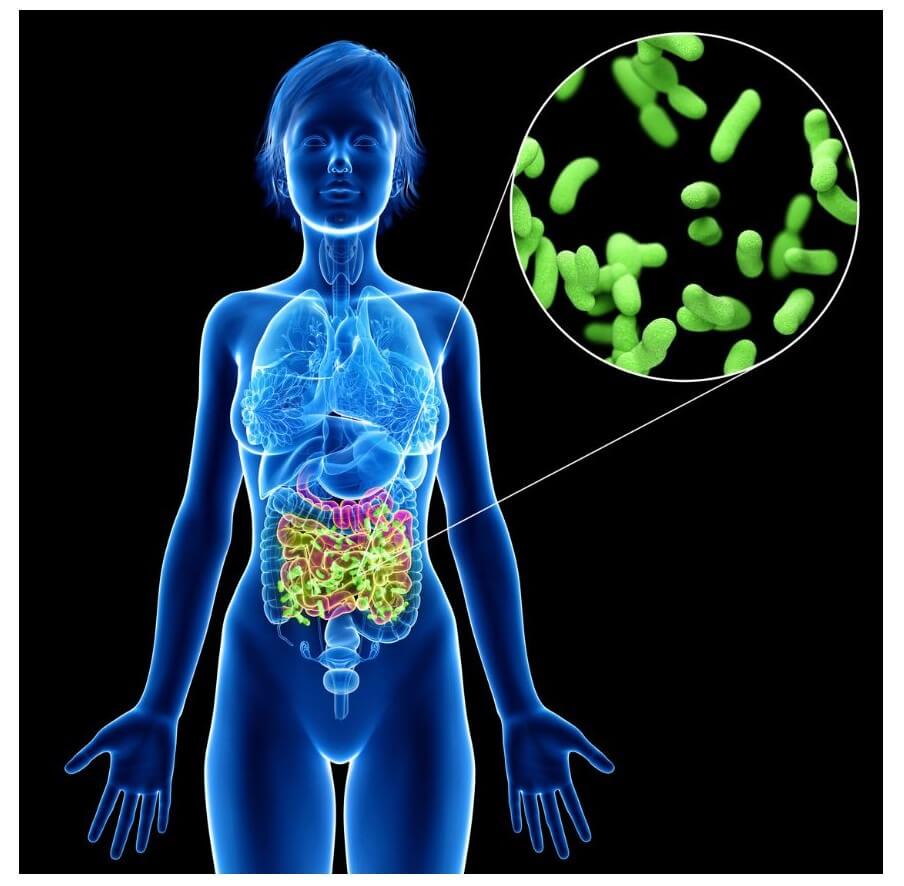You know that the health of your gut is paramount to looking and feeling your best, and this is especially true during menopause and perimenopause. Coincidentally, menopause also has a way of completely disrupting everything. Chief among these disruptions is one not often discussed, but incredibly important: the effect on your gut health.
As your body goes through an entire catalog of hormonal shifts and symptoms, your routine should change also to better support hormone balance, metabolic rate, fat storage, and insulin sensitivity—all factors crucial to feeling your best during this pivotal transition in life.
Read on for ideas to promote a healthy microbiome and decrease menopause symptoms.
Want a more in-depth approach to hormone balance?
Gut Changes during Perimenopause and Menopause
Studies have confirmed that the hormone changes that come with menopause directly affect gut health (1). Menopause corresponds with a decrease in the diversity of good bacteria in the gut, which has a plethora of downstream effects on health. Evidence suggests that having fewer types of bacteria present in the gut worsens many of the unpleasant menopausal symptoms.
We don’t talk about it enough, but menopause opens a new chapter of gut health.
In addition, as levels of these hormones drop, your body will produce more cortisol, the stress hormone (2). This can lead to gut inflammation and further disruption of the delicate balance in your gut.
What happens to your gut during menopause:

Hormonal fluctuations: The decline in estrogen and progesterone levels affects the gut microbiota composition and diversity, leading to changes in digestion, absorption, and bowel movements.
Altered digestion: The decrease in estrogen impacts gut motility, leading to irregular bowel movements (3).
Gut inflammation: Hormonal imbalances during menopause can increase gut inflammation, which may contribute to digestive discomfort and altered nutrient absorption.
Alterations in gut bacteria: Hormonal changes can disrupt the balance of beneficial bacteria in the gut, potentially leading to gastrointestinal symptoms like bloating, gas, and abdominal discomfort.
Listen: How to Heal Menopause’s Worst Symptoms with Nutrition, Ep. 300
Changes in digestion slow metabolism & increase fat storage
Menopausal women experience common symptoms like weight gain, hot flashes, and night sweats. What’s not often talked about is that menopausal symptoms can become much more severe in the presence of poor gut health. Changes to your gut flora during menopause can affect:
Hormone metabolism: The gut plays a crucial role in metabolizing hormones, including estrogen (4). An unhealthy gut slows the breakdown and elimination of estrogen after it has done its job, contributing to common symptoms like hot flashes & night sweats.
Metabolic rate and fat storage: Imbalanced gut flora can impact energy metabolism, affecting the body’s ability to regulate weight and store fat. Certain gut bacteria can promote inflammation and increase the likelihood of weight gain and abdominal fat storage (5).
Insulin resistance: Menopause is often synonymous with insulin resistance, making it harder for the body to process glucose effectively. This is a change that often gets overlooked, but over time it can lead to elevated blood sugar levels and an increased risk of developing type 2 diabetes.
Related: 10 Natural Ways to Get Rid of Hot Flashes
How to promote a healthy microbiome during menopause
At all stages of life, gut health is about supporting the abundance and diversity of unique flora that live in our gut and help out with important tasks like digestion but also things like metabolism, immunity, and hormones (6). The key to improving menopause symptoms lies in gut microbiome, which as we discovered, could use the extra help during menopause.
Implement a routine for healthy digestion involving changes to your diet, certain probiotic strains, and a daily practice of stress management to reduce inflammation. Whether it’s help with hormones, sleep support, or the unpredictable changes in mood, digestive health is an asset to alleviating menopause symptoms.
Read: Common Hormone Problems That Actually Begin in Your Gut
Update Your Diet
The food you consume has a direct correlation to the health of your gut microbiome. Eating whole, unprocessed foods is key to maintaining healthy bacteria and providing your body with essential vitamins and minerals necessary to stay balanced.
Avoid excessive intake of processed foods and added sugars which can negatively impact the good bacteria. Drink an adequate amount of water to support regular bowel movements and maintain gut health.
Pre- and probiotics

Consume a variety of fiber-rich foods, such as fruits, vegetables, whole grains, and legumes, which provide prebiotic fibers that nourish beneficial gut bacteria. Then, increase fermented foods which are a natural source of live probiotic bacteria. This includes foods like yogurt, kefir, sauerkraut, kimchi, and kombucha.
Probiotic supplements that contain Bifidobacterium animalis ssp. lactis helps to promote weight management and hormone balance (6). Lactobacillus gasseri, L. reuteri, and L. plantarum help support mood, gut health, and the immune system (7).
When looking for a high-quality probiotic supplement, here’s how to choose the right one for your needs.
Chew slowly
This may seem silly, but chewing slowly, taking your time, and focusing on your meal while you’re eating can reduce bloating & acid reflux, and help your digestive system by breaking food down right from the start.
During menopause and perimenopause, women are nearly 3 times more likely to have acid reflux and GERD symptoms (8). This is likely due to a drop in digestive helpers like gastric acid, which makes it more difficult to digest proteins and fats especially. Chewing and eating more slowly helps signal your stomach to start producing gastric components that help to break down your food so you can better absorb nutrients from it.
Manage stress
Chronic stress can disrupt the gut-brain axis and impact the gut microbiome (3). Engage in stress-reducing activities like meditation, yoga, or deep breathing exercises. Reducing stress is a good tool to improve gut health no matter your age, but many menopausal women note that their tolerance for stress significantly decreases—taking a higher physical and emotional toll on the body.
Read: What to Do When Stress & Anxiety Wreak Havoc on Your Gut
Get more magnesium
Magnesium has a lot of benefits for menopause symptoms, including for digestive issues, anything affecting your mood, and energy production (9). You can get it in supplement form, or from foods like leafy greens, avocados, and even dark chocolate!
Shop: 8 functional forms of magnesium in Serenease>>
Help managing menopausal digestive issues
Digestive health plays an important role in healthy hormone balance and metabolism during menopause. And a holistic approach to health can help you restore the natural balance needed to feel your best during menopause and beyond.
If you’re struggling to find balance during midlife, you can learn more about my guided program, the 4-Hour Hormone System, or check out my book, The Hormone Shift if you prefer to learn more at your own pace.
To support a healthy gut microbiome during menopause, eat plenty of fiber-rich foods, reduce intake of processed sugars and refined carbohydrates, drink plenty of water, consume probiotic-rich foods and supplements, and practice stress management techniques.
Important Considerations
It is important to remember that every woman’s experience of menopause is different, so be sure to speak with a healthcare professional before making any drastic changes to your diet or lifestyle. Additionally, if you are experiencing severe digestive issues such as chronic constipation, diarrhea, abdominal pain, or bloating, it is best to seek medical advice. But with the right support and lifestyle changes, menopause can be a positive experience that opens the door to the next chapter of life.
Resources
- https://www.ncbi.nlm.nih.gov/pmc/articles/PMC9379122/
- https://www.ncbi.nlm.nih.gov/pmc/articles/PMC2749064/
- https://journals.physiology.org/doi/full/10.1152/ajpgi.00144.2019
- https://pubmed.ncbi.nlm.nih.gov/35675542/
- https://www.ncbi.nlm.nih.gov/pmc/articles/PMC8569454/
- https://www.ncbi.nlm.nih.gov/pmc/articles/PMC7230722/
- https://www.ncbi.nlm.nih.gov/pmc/articles/PMC8537706/
- https://pubmed.ncbi.nlm.nih.gov/18460167/
- https://www.sciencedirect.com/science/article/pii/S2352364621000079


